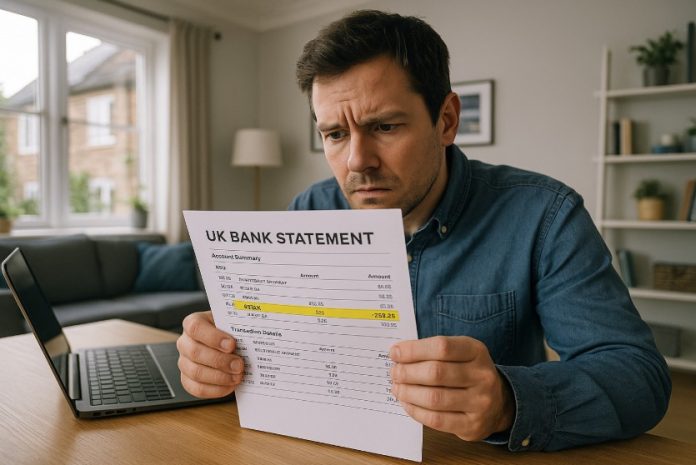Table of Contents
It can be unsettling to see an unfamiliar charge appear on your bank statement, especially when it’s listed under something cryptic like “FSUK.”
Understanding what this means and whether it’s a legitimate transaction is essential for protecting your finances.
This guide explores what FSUK represents, why it shows up, and what you should do if you don’t recognise the charge.
What Does FSUK Mean on a UK Bank Statement?
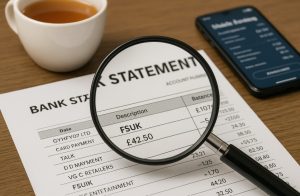
FSUK is a term that may appear as a transaction label on UK bank statements. While it may seem unclear or suspicious at first glance, FSUK has been linked to purchases made through the Sports Direct website (sportsdirect.com).
The abbreviation is believed to be shorthand for Frasers Group UK, which owns Sports Direct and several other retail brands.
When making an online payment, the merchant name appearing on a bank statement doesn’t always reflect the brand name familiar to the customer. This results in transaction names like FSUK showing up on statements instead of the expected “Sports Direct.”
Why Might FSUK Payments Appear Unexpectedly?
Many individuals across the UK are puzzled when an FSUK charge suddenly shows up on their bank statement.
While the transaction label itself seems vague, there are several practical and legitimate reasons why FSUK payments can appear without immediate recognition.
One of the most common causes is linked to online shopping from Sports Direct, a retailer owned by the Frasers Group.
When purchases are made on their website, the payment processor may label the transaction as “FSUK” rather than “Sports Direct,” which leads to confusion. However, this isn’t the only reason for unexpected FSUK payments.
Situations Where FSUK Charges May Appear Without Notice
- Orders Placed by Family or Household Members: In many households, multiple people may share a single card or have saved payment details on shared devices. A child, partner, or relative may have used your card to make a purchase on Sports Direct without informing you, causing a charge to appear unexpectedly under the FSUK name.
- Saved Payment Information Used Automatically: If you’ve previously shopped on Sports Direct and saved your card details, it’s possible for a one-click checkout or saved basket to trigger a purchase, especially if you revisit the site and complete an order without noticing the payment summary.
- Click-and-Collect or In-Store Orders Processed Online: Even if you made a purchase in-store, some physical retailers now use online payment gateways to process orders. Sports Direct, for instance, may process in-store purchases through its website systems, which could still show as FSUK on your statement.
- Subscription Renewals or Delivery Services: Sports Direct has previously offered services such as a Delivery Pass, which automatically renews on a monthly or annual basis. If you’ve signed up for this pass or similar membership offers during a checkout process, the renewal fee might be billed under FSUK at a later date.
- Affiliated Brands Using the Same Payment Processor: Frasers Group owns several retailers, including Flannels and House of Fraser. If you’ve made a purchase from any of these stores, the payment might still be processed using the FSUK tag if they share the same merchant system.
- Third-Party Checkout Systems: Some websites integrate with external payment gateways for faster processing. These systems might not always reflect the store’s name accurately in the transaction description. Instead, they display a generic or back-end merchant identifier such as FSUK.
- Delayed Payment Processing: Sometimes, retailers delay processing a payment until the product is shipped. If you placed an order days or weeks earlier, the FSUK charge may only appear once the product is dispatched, making it seem out of place or unexpected.
Could FSUK Be a Legitimate Transaction?
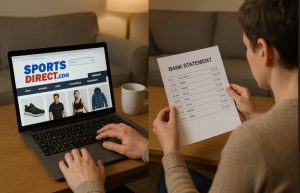
FSUK is typically a legitimate transaction, though the label might seem unfamiliar. It’s commonly tied to retailers that are part of the Frasers Group.
Many customers report that their online orders from Sports Direct show up as FSUK on their statements.
This confusion arises because merchants often use corporate or billing names rather than their retail-facing brand names when processing payments.
Common Retailers Associated with FSUK
| Retailer | Parent Company | May Appear as FSUK |
| Sports Direct | Frasers Group | Yes |
| House of Fraser | Frasers Group | Occasionally |
| Flannels | Frasers Group | Occasionally |
Customers who have shopped from one of these websites are encouraged to check order history and email confirmations to see if the charge matches.
When Should You Be Concerned About an FSUK Charge?
If you are unable to connect an FSUK charge to any recent purchases, it could be a sign of an unauthorised transaction. Though most FSUK charges are genuine, there are certain red flags to watch for.
Warning Signs That May Require Investigation
- A charge made during a time you were not shopping online
- Repeated small FSUK charges over a short period
- FSUK transactions following card loss or suspected fraud
- The transaction is international or made in a currency other than GBP
In such cases, it’s essential to act quickly and consult your bank. They can investigate whether the transaction is legitimate and offer support if it turns out to be fraudulent.
How Can You Verify an FSUK Payment on Your Statement?
Identifying the source of an FSUK transaction can be straightforward if the correct steps are taken. The goal is to determine whether the charge is linked to a valid purchase.
Methods to Verify FSUK Transactions
- Review online banking details by clicking into the transaction for more information
- Check order confirmations in your email, especially from Sports Direct or affiliated brands
- Compare the transaction amount and date with your known purchases
- Speak to family members or colleagues who may have access to the card
- Contact your bank for merchant details linked to the FSUK charge
Online banking platforms often provide additional data such as merchant location or transaction references that may help you identify the charge.
What Should You Do If You Don’t Recognise an FSUK Payment?
Unfamiliar charges on your bank statement can be alarming, especially when the label is as cryptic as “FSUK.” If you come across an FSUK transaction that you do not recognise or believe you didn’t authorise, it’s important to act promptly.
While the charge may be legitimate often linked to Sports Direct or other Frasers Group retailers — it’s crucial to verify this before assuming it’s safe.
If you’re unable to identify the source of the payment after reviewing your recent shopping activity, emails, or conversations with family members, the transaction may be unauthorised or fraudulent.
In such cases, taking immediate and structured action is essential to protect your finances.
Step-by-Step Actions to Take for Unrecognised FSUK Charges
1. Review the Full Transaction Details in Your Banking App: Most modern banking apps and online banking platforms allow you to view extended transaction details by tapping or clicking on the specific payment. Look for:
-
- Merchant description or company name
- Date and time of the transaction
- Merchant location or reference ID
These details can provide valuable context, helping you determine if the transaction might be legitimate but mislabelled.
2. Check Your Emails and Account Activity: Go through your email inbox for any order confirmations, shipping updates, or receipts from Sports Direct or affiliated retailers around the date of the FSUK charge.
Also check:
-
- Spam or promotions folders (emails may be filtered)
- Any accounts linked to your card for possible auto-renewals or digital downloads
3. Speak to Family Members or Colleagues: If your card is shared within your household or work environment, ask if someone else made the purchase. Many FSUK charges have turned out to be legitimate orders placed by spouses, children, or colleagues using a shared or saved card.
4. Contact the Retailer Directly (if known): If you suspect the transaction is from Sports Direct or another Frasers Group brand but want confirmation, you can contact their customer service.
Provide them with:
-
- The date of the transaction
- The amount charged
- Any transaction reference available
They may be able to locate the order and confirm the details for you.
5. Report the Transaction to Your Bank: If none of the above steps help clarify the charge, your next action should be to notify your bank. They have dedicated fraud and dispute resolution teams that deal with suspicious or unrecognised transactions daily.
When contacting your bank:
-
- Explain that the FSUK transaction is unrecognised
- Ask for any additional transaction metadata (merchant ID, location, processor)
- Request that they place a temporary hold on your card if you suspect fraud
- File a formal dispute if necessary
6. Block or Freeze Your Card (If Fraud Is Suspected): Most UK banks allow you to instantly freeze your card using the mobile app. This prevents any further charges while you investigate. You can later request a new card to be issued if fraud is confirmed.
7. Monitor Your Account for Further Unauthorised Activity: Once a suspicious charge has occurred, there may be more to follow. Keep a close watch on your bank account for:
-
- Unusual transaction times (e.g., early morning or late night)
- Charges from unknown merchants
- Small test payments (used by fraudsters to verify card validity)
Are FSUK Payments Related to Online Transactions or Subscriptions?
In some cases, FSUK may represent not a single purchase but an ongoing subscription or auto-renewal. Sports Direct has offered club memberships and delivery subscription services in the past, which can trigger recurring charges.
Customers may forget they signed up for such services, especially if they were offered as free trials or discounted promotions.
FSUK Subscription Examples
| Service Type | Source | FSUK Likely? |
| Sports Direct Delivery Pass | Sports Direct Website | Yes |
| Club Membership Subscriptions | Promotional Sign-up Page | Yes |
| Third-Party Service Add-ons | During Checkout Process | Occasionally |
Checking your emails for subscription confirmations or payment notifications can help confirm if the FSUK charge relates to a renewal.
How Can You Prevent Future FSUK or Unauthorised Charges?
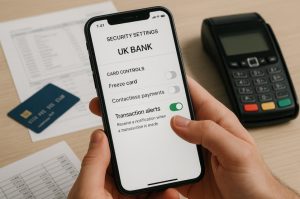
To avoid unexpected FSUK charges in the future, adopting better monitoring and payment practices is essential.
- Regularly check and reconcile bank statements
- Avoid saving card details for faster checkout
- Set up transaction alerts with your banking app
- Cancel subscriptions or delivery passes if no longer used
- Use virtual debit cards or disposable card numbers for online payments
By staying vigilant and maintaining a record of your purchases, you reduce the likelihood of confusion or fraud associated with FSUK or similar unfamiliar labels.
Can You Get a Refund for a Suspicious FSUK Charge?
Yes, if the FSUK charge is found to be unauthorised, most UK banks will process a refund through their fraud resolution or chargeback procedures. Whether you are successful will depend on how quickly you report the issue and the documentation you provide.
Typical Refund Process Through UK Banks
| Step | Action Required | Timeframe |
| Initial Contact | Call or message your bank | Immediate |
| Dispute Filing | Provide evidence (screenshots, emails, etc.) | Within 24–48 hrs |
| Bank Investigation | Bank contacts the merchant if necessary | Up to 15 working days |
| Outcome & Refund | If successful, funds are returned | Depends on bank |
Some banks may offer provisional credits while the investigation is ongoing, especially in cases where fraud is suspected.
Is FSUK a Scam or Just a Misunderstood Transaction?
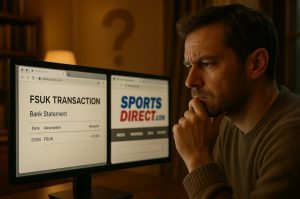
While FSUK may appear suspicious, it is most often a case of merchant branding confusion.
The majority of these charges originate from genuine purchases, typically made through Sports Direct or a related retailer. That said, being proactive about unknown charges is always recommended.
Verifying transactions, speaking to your bank, and securing your card information will protect you whether the charge is valid or not.
Conclusion
FSUK on your bank statement typically refers to a legitimate transaction, often from Sports Direct or a related retailer.
While the abbreviation can cause confusion, it’s rarely a scam. Still, always verify any unknown charges and act promptly if something appears suspicious. Your awareness and quick action can protect you from unnecessary losses or fraud.
FAQs About FSUK on Bank Statements
What company is behind FSUK transactions on my statement?
FSUK is most often associated with Sports Direct or retailers under the Frasers Group, although it may not be clearly branded.
Is FSUK a secure payment processor?
Yes, when linked to known retailers, FSUK transactions are typically processed through secure systems; however, the label itself isn’t a payment processor.
Can a small FSUK charge indicate fraud?
Small, repeated charges are common red flags for testing stolen cards. If this happens, contact your bank immediately.
How do I stop recurring FSUK payments?
You can cancel the payment by contacting your bank or the original merchant, especially if it’s linked to a subscription.
Does FSUK ever appear on credit card statements?
Yes, FSUK can show up on both debit and credit card statements if the transaction is processed through a linked payment system.
Why doesn’t my statement show “Sports Direct” instead of FSUK?
Some companies use parent company identifiers or third-party billing names on statements, which leads to confusion.
Can I block FSUK from charging me again?
Yes, you can request a block or restriction on future payments to FSUK by contacting your bank directly.


